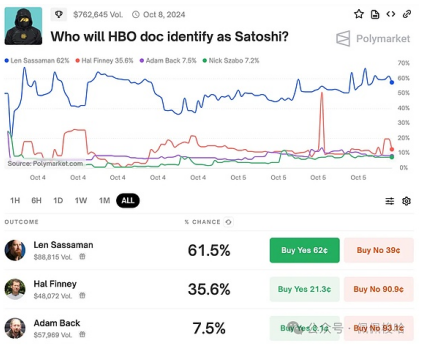The HBO documentary has once again sparked speculation about the identity of Bitcoin's creator, with theories regarding Len Sassaman being quite plausible.
Original Title: "My Friend, Satoshi?"
Written by: Justin Newton
Translated by: Koala, Mars Finance
The HBO documentary released on Tuesday has reignited speculation that my late friend Len Sassaman is the anonymous inventor of Bitcoin, Satoshi Nakamoto. The filmmaker claims to have met in person someone he believes to be Satoshi, making it unlikely that Len, who committed suicide in 2011, is a suspect. Nevertheless, others have convincingly detailed Len's technical abilities, which make him a logical candidate for Satoshi.
Regardless of what the film claims, I want to share what I know about Len and why I also believe he could be Satoshi.
Justin Newton is the CEO of Netki, a verification service provider. This article is adapted from a post on LinkedIn.
When I met Len Sassaman, he was wearing a wrinkled jacket and a tie. We were in the living room of Thomas Roos, a history teacher at The Hill School in Pottstown, Pennsylvania. Len was a junior at the time, and I, an alumnus working in the data center industry, had returned from the San Francisco Bay Area to spend a long weekend with Tom.
Len sat on the couch while I sat in a chair next to him. Tom was a mentor of mine, known for often taking care of kids from difficult backgrounds or those struggling to fit in. Len was one of those kids. He had difficulty maintaining normal eye contact and always downplayed his achievements.
Despite being only 16, Len showed tremendous potential in computer science, and Tom asked me if I would be willing to be a friend who could help Len find direction in that field. I owed Tom a lot, so I agreed, of course. We spent about two and a half hours in Tom's living room that day, drinking a hot tea that was equivalent to Jolt Cola, as it contained all the sugar and had twice the caffeine of a regular cup of tea.
Looking back on that conversation, I remember we discussed many things, and in hindsight, some of Len's ideas aligned closely with Satoshi's philosophy.
Another mentor of mine had pointed out to me how technology and history influence each other in a cyclical manner, and how great inventions can change society and the world. I shared this moment of insight with Len: that excellence in technology is like a lever, and if enough force is applied, it can push the world in the direction we hope for.
At that moment, Len transformed from a passive, shy, introverted state into one filled with passion and engagement. Until then, he had lived in a world dominated by popular kids; seeing a path that could help shape the future without needing to stand in the spotlight led to a significant and immediate change in his posture—he went from slouching to sitting up straight and leaning forward, his gaze shifting from downcast to bright and focused on me.
At this point, Tom leaned back in his chair, wearing a knowing smile, occasionally getting up to ensure that both Len and I had full cups of "rocket fuel" to keep the conversation going. For the next few hours, we discussed the importance of freedom of communication, online anonymity, and the democratization of information. The conversation also touched on developing open-source software and standards, expressing our values through code, and creating software that could change the world, predicting some of its impacts.
Silicon Valley Years
Shortly after I moved to Los Angeles to work for the internet service provider NetZero, Len also moved to San Francisco. I introduced him to my friends in the North American Network Operators Group (NANOG) and the Internet Engineering Task Force (IETF) community to help him find his circle.
After that, we kept in touch for about a decade. Sometimes we would go a while without contact, then I would receive an email or a text message with just a single line: "Do you have time for a call?" with no context. Some calls were simple questions about career advice, like when he was considering job opportunities or pondering whether he should stay in a position that he couldn't fully engage with. These calls were usually short because he just needed someone he trusted in the industry to confirm whether his thoughts or views were correct.
Those longer calls resembled our conversation on Tom's sofa. We would spend hours discussing the value of open and permissionless innovation, and the importance of a network that allows people to build without permission.
We also spent a long time weighing the costs of allowing bad actors to do bad things against the benefits of enabling good actors to act quickly without waiting for slow and conservative institutional approvals.
Ultimately, we agreed that the network itself should be completely open, and controls should be built at other levels, implemented as much as possible through technology, and only resorted to legal means when absolutely necessary.
This principle is at the core of Bitcoin and may be its most valuable and enduring feature.
Satoshi? Maybe
Many people have provided logical reasons why Len could not be Satoshi, but in my view, these individuals do not understand who Len was. Here are my responses to their points:
"Len wasn't wealthy, and his family isn't wealthy now." Len believed that the purpose of working in technology was not to get rich but to create the future we all want to live in. This aligns perfectly with the fact that Satoshi never profited from Bitcoin as he or they could have, since the coins mined by the Bitcoin founder have never been moved. I can completely imagine Len destroying the private keys to his mining pool wallet to ensure that neither he nor anyone else could profit from it.
"Len was a Bitcoin skeptic and criticized it on Twitter." Len often harshly criticized projects he was deeply involved in. A part of his personality was that he always felt his work wasn't good enough, even when it was excellent. Publicly voicing these criticisms might have been a good way for him, if he were indeed Satoshi, to maintain anonymity and distance.
Len firmly believed that an open and permissionless network could drive innovation. It was this very characteristic of Bitcoin that initially attracted me, and I wouldn't be surprised if Len built such a network.
Len 100% believed that individual rights supersede authoritative power. At the same time, he was not the typical libertarian who flocked to the early Bitcoin community. I can completely imagine that if he were Satoshi, seeing his creation exploited by a group of quick-rich speculators might have prompted him to abandon the project and possibly exacerbate his depression.
It needs to be clarified: Len and I never discussed Bitcoin. If he were Satoshi, I could completely understand why he wouldn't want to discuss the topic with me or our friends. After all, I don't even know if he is Satoshi. Given his skills and his qualities as a person, he certainly could be.
Regardless, Len was an exceptional person who deserved better treatment than the world gave him. His memory will forever shine brightly in my heart.
免责声明:本文章仅代表作者个人观点,不代表本平台的立场和观点。本文章仅供信息分享,不构成对任何人的任何投资建议。用户与作者之间的任何争议,与本平台无关。如网页中刊载的文章或图片涉及侵权,请提供相关的权利证明和身份证明发送邮件到support@aicoin.com,本平台相关工作人员将会进行核查。



